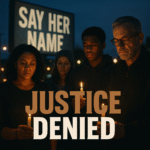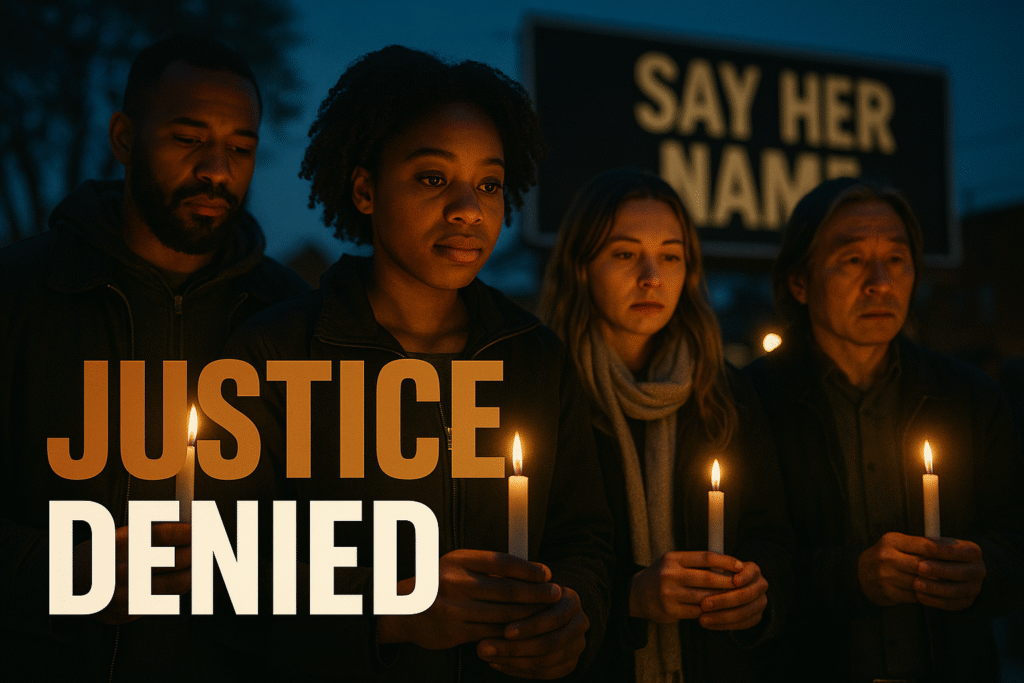

Justice Denied: The Dachena Warren-Hill Case
By Darius Spearman (africanelements)
Support African Elements at patreon.com/africanelements and hear recent news in a single playlist. Additionally, you can gain early access to ad-free video content.
The Tragic Shooting of Dachena Warren-Hill
Dachena Warren-Hill, a 20-year-old Black woman, lost her life on November 19, 2023, in Fort Wayne, Indiana. Officer Mark A. Guzman of the Fort Wayne Police Department shot and killed her while she was attempting to escape a domestic dispute (wfft.com). The incident occurred on Winchester Road (wfft.com). This tragic event has sparked significant controversy and a lawsuit from her family.
Officer Guzman claimed he feared for his life, stating that Warren-Hill was driving her car directly toward him. However, body camera footage released later presented a different picture. The footage showed Warren-Hill driving away from the officer when he opened fire, suggesting he was not directly in the car's path.
The Justification of Force
The Allen County Prosecuting Attorney's Office concluded that Officer Guzman's use of force was justified (wane.com). This determination means the officer's actions were not deemed criminally liable after an investigation (21alivenews.com). Prosecutors typically assess whether the officer reasonably believed their life or the lives of others were in danger, or if there was a threat of serious bodily harm (wane.com). The prosecutor stated that the officer was justified, believing the force was necessary to prevent serious bodily injury or death to himself and/or citizens (wfft.com).
In other cases, Fort Wayne police have stated that “actions from occupants inside the vehicle” caused an officer to fire during a traffic stop (nbcnews.com). In another incident, an officer gave verbal commands for a man to drop a gun, but he refused, leading to the officer shooting him (wane.com). These examples highlight the types of situations where officers claim justification for using deadly force.
Community Outcry and Protest
Warren-Hill's family and community members have strongly protested the shooting and questioned the official narrative. They have particularly raised concerns about the body camera footage. Following her death, family and friends paid for a billboard that read, “Say Her Name. Dachena Warren-Hill; A Vibrant Loving Preschool Teacher” (wane.com). This act served as a public memorial and a call for accountability.
A vigil was held days after the shooting, where attendees demanded more information and answers from police (wane.com). Warren-Hill's mother, Danisha Warren, has been a vocal advocate, participating in protests and speaking out against the police's actions (wfft.com). The family's frustration with transparency, especially regarding the body camera footage, has been a recurring theme (21alivenews.com). The release of body camera footage is often delayed due to ongoing investigations, which can lead to public frustration (21alivenews.com). When footage is released, it aims to provide a transparent view, though edited versions can still raise questions (nbcnews.com).
The Lawsuit: Allegations and Accusations
Warren-Hill's mother filed a lawsuit in federal court against Officer Guzman, the department's former police chief, and Cedric Brown (atlantablackstar.com). The lawsuit makes several serious allegations. It claims Warren-Hill did not pose a serious threat to the officer or others. Furthermore, it alleges that Guzman fired multiple gunshots without attempting less lethal options (atlantablackstar.com). The lawsuit accuses Guzman of “willful, malicious, and intentional act of shooting” and an “unconstitutional use of deadly force” (atlantablackstar.com).
The lawsuit also includes accusations against Cedric Brown for assault and battery. These alleged actions by Brown led to Warren-Hill attempting to flee in the car (atlantablackstar.com). The legal terms used in the lawsuit, such as “unreasonable seizure,” “excessive force,” “negligence,” and “assault and battery,” refer to specific legal concepts. An “unreasonable seizure” typically refers to a violation of the Fourth Amendment, which protects people from arbitrary arrests and searches. “Excessive force” means using more force than is reasonably necessary in a given situation. “Negligence” implies a failure to exercise reasonable care, resulting in harm. “Assault and battery” refers to an intentional act causing harmful or offensive contact with another person.
The Investigation Process and Transparency
The investigation into officer-involved shootings in Fort Wayne typically involves the Allen County Prosecutor's Office. This office reviews the incident to determine if the officer's actions warrant criminal charges (21alivenews.com). The police department also conducts its own internal investigations. Body camera footage plays a significant role in these reviews (wane.com). The Fort Wayne Police Department and the Indiana State Police can also be involved in investigating fatal officer-involved shootings (wane.com).
Despite these processes, concerns about transparency persist. The victim’s family has consistently demanded the release of body camera footage, expressing frustration with the department’s transparency (21alivenews.com). Fort Wayne Mayor Sharon Tucker stated that body camera footage of an officer shooting and killing 22-year-old Linzell Parhm would be released after his family viewed it (wane.com). This practice aims to provide a measure of transparency, but the timing of release and any editing of the footage can still be points of contention for families and the community.
The Role of Body Camera Footage
Body camera footage is a crucial piece of evidence in officer-involved shootings. Its release often sparks significant community and family interest. In Fort Wayne, there have been instances where the release of body camera footage was delayed due to ongoing investigations. This delay has led to frustration from families and the public regarding transparency (21alivenews.com). When released, the footage aims to provide a transparent view of the events. However, edited versions can still raise questions and fuel disputes about the official narrative.
The Fort Wayne Police Department has released edited body camera video of traffic stop shootings, stating it was to provide the public with a transparent and accurate understanding of the events (nbcnews.com). Despite these efforts, the controversy surrounding the Dachena Warren-Hill case highlights the ongoing struggle for full transparency and accountability in police shootings, especially when the footage appears to contradict initial police statements.
Understanding Legal Terms in Police Cases
When an officer's actions are deemed necessary to prevent serious bodily injury or death to themselves or others. This determination is made after an investigation, typically by a prosecutor's office, to assess if the force used was reasonable under the circumstances.
A violation of the Fourth Amendment, which protects individuals from arbitrary arrests and searches by government agents. It means a person's freedom or property has been taken without proper legal justification or probable cause.
The use of more force than is objectively reasonable in a given situation by law enforcement. This is determined by considering the severity of the crime, whether the suspect poses an immediate threat, and whether they are actively resisting arrest.
A failure to exercise the care that a reasonably prudent person would exercise in similar circumstances. In legal terms, it refers to a breach of duty that results in harm or injury to another party.
Assault is the threat or attempt to inflict physical harm, while battery is the actual physical contact that results in harm or offense. These are intentional acts that cause harmful or offensive contact with another person.
The Impact on the Black Community
The shooting of Dachena Warren-Hill resonates deeply within the Black community, particularly given the historical context of police violence against Black individuals. The family's call to “Say Her Name” aligns with a broader movement to highlight the lives lost to police brutality and demand justice. The community's response, including vigils and protests, underscores a collective demand for accountability and transparency from law enforcement. These actions are not merely isolated incidents but are part of a continuous struggle for civil rights and equitable treatment.
The concerns raised by Warren-Hill's family about the body camera footage and the official narrative reflect a widespread distrust that many Black communities feel toward police investigations. When the footage appears to contradict police statements, it reinforces the belief that official accounts may not always present the full truth. This skepticism is rooted in a long history of incidents where police actions against Black individuals have been justified by authorities, even when community members and evidence suggest otherwise. The lawsuit filed by Warren-Hill's mother is a significant step in seeking legal redress and challenging the system that cleared the officer of wrongdoing.
Key Events in the Dachena Warren-Hill Case
Dachena Warren-Hill, 20, is shot and killed by Fort Wayne Police Officer Mark A. Guzman while attempting to flee a domestic dispute on Winchester Road.
A vigil is held for Dachena Warren-Hill, with attendees demanding more information and answers from police.
Family and friends pay for a billboard reading, “Say Her Name. Dachena Warren-Hill; A Vibrant Loving Preschool Teacher.”
The Allen County Prosecuting Attorney's Office concludes Officer Guzman's use of force was justified. Body camera footage is released.
Protesters gather at the Allen County Courthouse to protest the shooting, with Dachena's mother, Danisha Warren, speaking out.
Dachena Warren-Hill's mother files a federal lawsuit against Officer Guzman, the former police chief, and Cedric Brown.
The Ongoing Fight for Justice
The lawsuit filed by Dachena Warren-Hill's mother represents a critical step in the ongoing fight for justice. It challenges the official narrative and seeks to hold accountable those believed responsible for her death. The allegations of unreasonable seizure, excessive force, and negligence highlight systemic issues that activists and community members have long pointed out in policing. The inclusion of Cedric Brown in the lawsuit also underscores the complex interplay of domestic violence and police intervention, where victims attempting to escape dangerous situations can tragically become targets.
The outcome of this lawsuit will be closely watched by many. It has the potential to set a precedent for how similar cases are handled in the future. Beyond the legal proceedings, the case of Dachena Warren-Hill serves as a powerful reminder of the human cost of police violence and the persistent need for reform. The community's continued advocacy, protests, and demands for transparency ensure that Dachena's story remains in the public consciousness, pushing for meaningful change and accountability within law enforcement.
Community Engagement in Police Shooting Cases
ABOUT THE AUTHOR
Darius Spearman has been a professor of Black Studies at San Diego City College since 2007. He is the author of several books, including Between The Color Lines: A History of African Americans on the California Frontier Through 1890. You can visit Darius online at africanelements.org.
